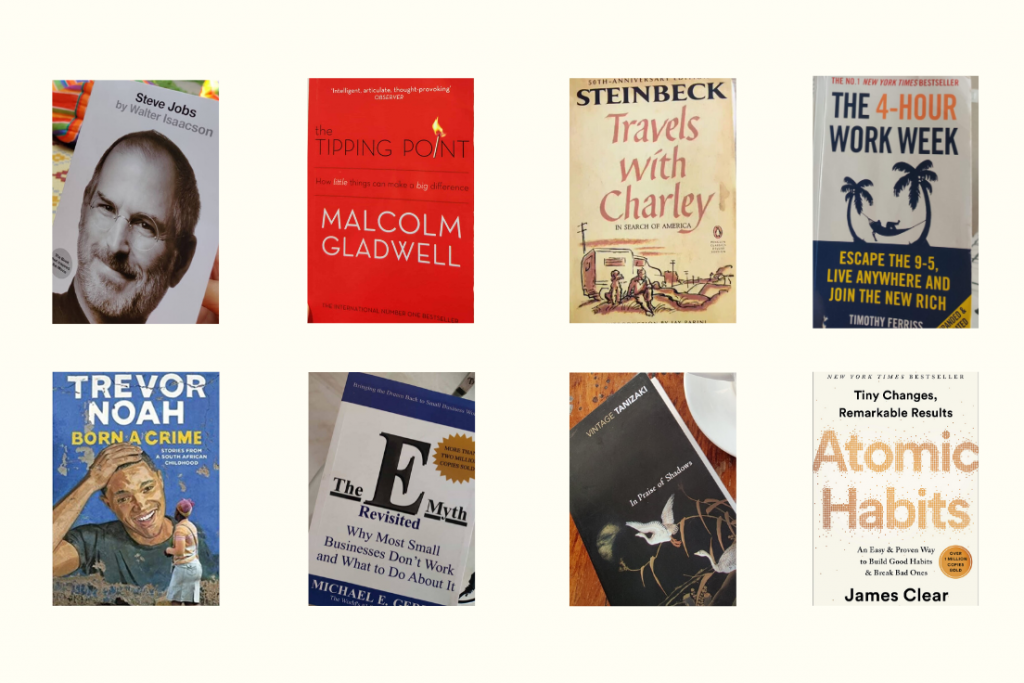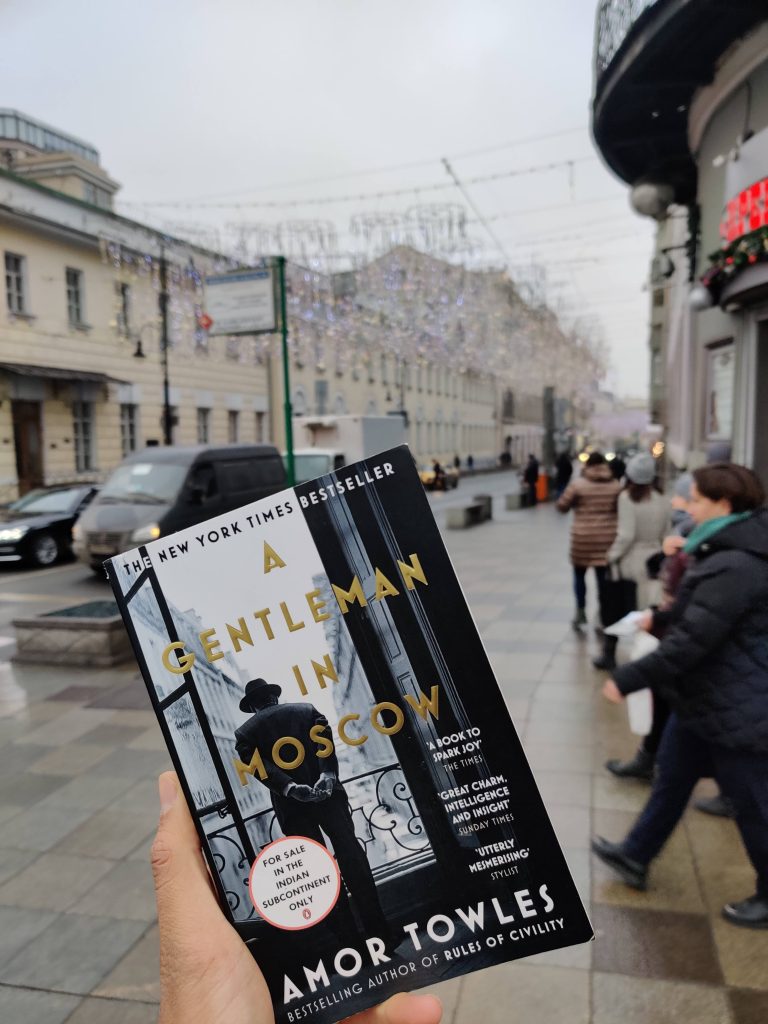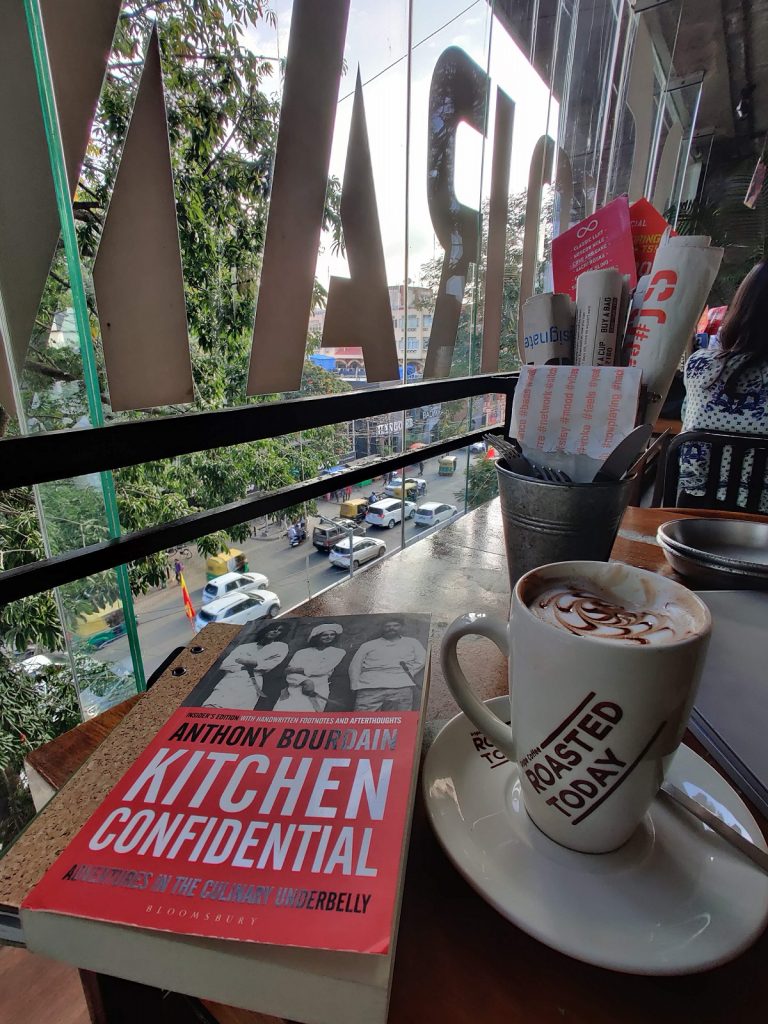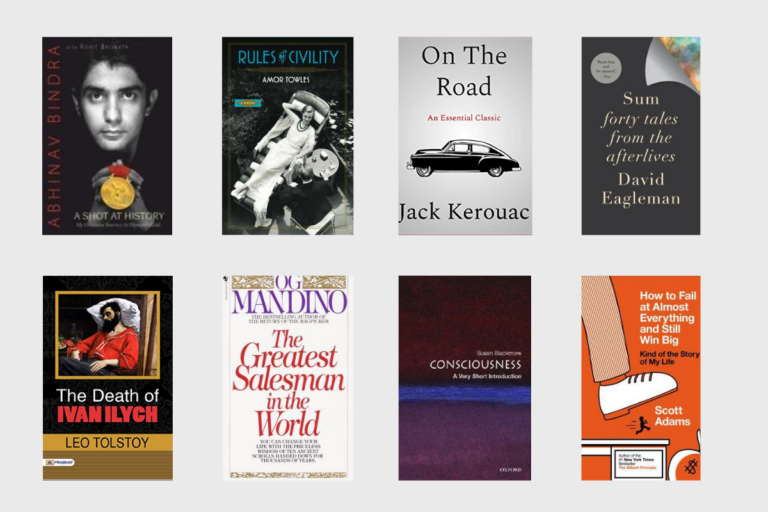I had set a goal of reading 2 books per month during my yearly goal setting session in January. By Jan 20th, I didn’t even finish 1 book, and while writing this, on 29th Feb, I just finished my 8th book of the year.
I was always a slow reader but now I’m picking up pace. My experiments with different formats (audiobooks, e-books, hard copy) helped me increase the books I’ve read.
In May 2019, I had picked up the Atlas Shrugged by Ayn Rand, a 1000-page book with the smallest size text on each page. It took me over 5 months to finish it. If you give it to me now, I’m confident I’ll finish it in less than a month.
I remember reading Kitchen Confidential in November last year and finishing it in under a week (a big achievement for me). I also remember the café’s I sat in while reading the book and thinking about the life of Anthony Bourdain. Similarly, I started reading A Gentleman in Moscow while traveling in Moscow in December but couldn’t go beyond the 2nd chapter because of the busy schedule. As soon I returned home, I devoured the book in 2 days, memories of Russia still fresh in my mind.
Needless to say, I love reading books. But it’s hard to retain information and stories when reading a lot. My choice of genre is especially a very unique mix, and sometimes I forget why I picked up a certain book and what lessons I learned. So, to keep a track of it, I decided to write this post.
This blog is not so much a review of the books, but rather an attempt to outline my most memorable parts and favorite quotes from them. But if you’re looking for recommendations and not sure what to read next, the below will be useful without spoiling too much.
So, without further ado, here are the 8 books from January & February in the order I read them:
Click on the book names to find it on Amazon.
Why?
I picked this up on 8th Jan at Bangalore Airport before boarding my Bangkok flight. I love reading biographies and memoirs because they give a peek in the life of incredible people whom I admire and understand their journey better. Jobs was on my list for a while, but I hesitated because of the size of the book, more than 600 pages. I didn’t know much about the life of Jobs and I needed something to read for the flight, so I bought it.
What to expect?
Walter Isaacson is a brilliant writer and this book will smash your expectations. But come with an open mind, not everyone is a fan of Job’s personality. There’s a lot to him than meets the eye. A complex visionary, an anti-materialistic hippie, a Zen devotee and a lover of simplicity.
By beliefs, Steve is nonmaterialistic, but all his ventures and innovations aimed at spiking materialism in the masses. It’s a crazy ride, from his early days in his father’s garage, his travels in India and adventures with drugs and meditations to creating innovative powerhouses (Apple & Pixar).
You will notice Steve Jobs was a big asshole many times. He was rude, did not care about social norms, a very eccentric guy. But even his haters were attracted to him. The guy was charming in an unusual way.
The book follows his journey from Apple to NEXT to Pixar and back to Apple and describes in great length how various products came to life, like the iPod, iTunes, and the iPhone. You won’t be disappointed.
Favorite quote:
“If you want to live your life in a creative way, as an artist, you have to not look back too much. You have to be willing to take whatever you’ve done and whoever you were and throw them away. The more the outside world tries to reinforce an image of you, the harder it is to continue to be an artist, which is why a lot of times, artists have to say, “Bye. I have to go. I’m going crazy and I’m getting out of here.” And they go and hibernate somewhere. Maybe later they re-emerge a little differently.”
Steve Jobs
The Tipping Point by Malcolm Gladwell
Why?
I bought this book 7 years ago, strolling through the streets of Mumbai, at the Oxford Library in Churchgate. I was trying to build up a reading habit and when I googled Malcolm Gladwell, he seemed like a popular author so I got a copy and forgot all about it.
I found it again in my hometown in December and thought of giving it another go.
What to expect?
Honestly, it was drudgery finishing this book. Now I remember why I didn’t finish it 7 years ago – It was boring. The book discussed how ideas, trends, and social behaviors tip, meaning how they cross an inflection point and become popular, spreading like wildfire.
Malcolm Gladwell discusses the three rules of such epidemics, namely the Law of the Few, the Stickiness Factor and the Power of Context. The lessons are timeless but not that relevant, maybe just for me. Though there were some good case studies, like how Sesame Street started and became popular, how Hush Puppies shoes became a thing, and the rise and fall of New York City Crime just by getting rid of graffiti’s in the suburban metros.
Favorite quotes:
“Emotion is contagious.”
Malcolm Gladwell
“If you want to bring a fundamental change in people’s belief and behavior…you need to create a community around them, where those new beliefs can be practiced and expressed and nurtured.”
Why?
I had 3 audible credits expiring in a month, so I bought 3 audiobooks. This was one of them. I had heard good reviews from a few bloggers I follow and at the start of the year, I had identified several habits that I want to develop and some that I want to let go. This seemed like a good book on habit formation and mastering tiny behaviors that lead to remarkable results.
What to expect?
Lots of great frameworks to make good habits inevitable and bad habits impossible. The book starts with the author’s personal story (which is very inspiring) and goes deeper into analyzing why tiny changes make a big difference (compounding) and how we can build better habits. James Clear explains this through his 4 laws of habit formation; Make it obvious, Make it Attractive, Make it Easy, and Make it Satisfying.
Yeah, I know this sounds like a simple framework but that’s the key. Each law is filled with inspiring and entertaining true stories and actionable steps to put it into action. James also describes how to reverse these laws and break bad habits.
It’s a great book, but I recommend reading it when you have the time and energy to implement the lessons.
Favorite quotes:
“Be the designer of your world and not merely the consumer of it.”
James Clear
“It is easy to get bogged down trying to find the optimal plan for change: the fastest way to lose weight, the best program to build muscle, the perfect idea for a side hustle. We are so focused on figuring out the best approach that we never get around to taking action. As Voltaire once wrote, “The best is the enemy of the good.”
Travels with Charley in Search of America by John Steinbeck
Why?
Because Tim Ferris recommended it on his Instagram. And I wanted to read a travelogue and something different from the usual biographies and business/self-help books I read.
What to expect?
Nothing. Go without expectations. You might want to read up on the author John Steinback if you wish. He’s an American novelist, who won the Nobel Prize for Literature in 1962. He put a house on a pickup, left his wife behind in their Long Island home and traveled around the USA for several months. His quest was to understand “What are Americans like today?” because he made his living writing about it but felt he lost touch with his land. And Charley is his dog, a French poodle.
It is poetic and beautiful. It is dark and mysterious. It is funny and infuriating.
I was reminded of my solo road trip to New Zealand last year while reading this. It’s a short read too, though there were some very American things I could not relate to. Nonetheless, a good bedtime read.
Favorite quote:
“I saw in their eyes something I was to see over and over in every part of the nation- a burning desire to go, to move, to get underway, anyplace, away from any HERE. They spoke quietly of how they wanted to go someday, to move about, free and unanchored, not toward something but away from something. I saw this look and heard this yearning everywhere in every state I visited. Nearly every American hungers to move.”
John Steinback,
The E-myth Revisited by Michael E. Gerber
Why?
-A mentor in my previous job in Melbourne recommend this to a small business owner
-I’ve seen badly run small business in India and I wanted to learn what to do about it
-I need a business book to keep me sane.
What to expect?
Only read this book if you own a business or wish to own a business in the future. Michael E. Gerber is a small business guru. He identifies three roles business owners play – the technician, the entrepreneur, and the manager and how these roles conflict with each other. McDonald’s is a prime example in the book, the key point being their product is not the burgers, it’s the business itself (franchising)
The book teaches how to create unbreakable and replicable systems and processes to sustain a small business and help it grow. He says we should think of our business as a franchisee and gives steps to create a franchise prototype.
Valuable lessons on defining your strategic objectives, organization/management/people/marketing and systems strategy.
Favorite quotes:
“If your business depends on you, you don’t own a business—you have a job. And it’s the worst job in the world because you’re working for a lunatic!”
Michael E. Gerber
“The work we do is a reflection of who we are. If we’re sloppy at it, it’s because we’re sloppy inside. If we’re late at it, it’s because we’re late inside. If we’re bored by it, it’s because we’re bored inside, with ourselves, not with the work. The most menial work can be a piece of art when done by an artist. So the job here is not outside of ourselves, but inside of ourselves. How we do our work becomes a mirror of how we are inside.”

The 4-Hour Work Week by Tim Ferris
Why?
Tim Ferris is one of my favorite guys on the internet. I don’t remember how I found him, but I’m glad I did. I regularly consume his content, especially podcasts (The Tim Ferris Show) and the 5-bullet Friday.
I picked up this book in late 2018, after graduating from college to work on lifestyle design. But I got too comfortable in my job and stopped reading after the first 100 pages, waiting for the perfect time.
It was time to get serious about my lifestyle and future again, so I picked it up again and finished it in a week.
What to expect?
The back cover of the book has a warning, “Do not read this book unless you want a new way of living”.
Very apt. The title at first may seem like a scam for marketing, but the book is packed with a lot of good stuff for entrepreneurs and employees alike.
Tim himself has done what he teaches and shows you how to exchange your career for life for short work bursts and frequent ‘mini-retirements’ & how to outsource your life.
There’s a lot of work this book demands of you, but that’s required to build a life of your dreams. I highly recommend it, but it’s not for everyone. If you plan on reading it, first get to know Tim by his blog and podcasts and then get the book.
Favorite quotes:
“If you are insecure, guess what? The rest of the world is, too. Do not overestimate the competition and underestimate yourself. You are better than you think.”
Tim Ferris
“$1,000,000 in the bank isn’t the fantasy. The fantasy is the lifestyle of complete freedom it supposedly allows.”
Why?
This was the 2nd audiobook I had bought to use up my remaining credits. It was recommended by many friends and I love reading biographies and memoirs. I’m not a big Trevor Noah fan, but the opportunity to peek in his early days in South Africa excited me, especially because South Africa was uncharted literary territory for me.
What to expect?
Laughter, shock, drama, pity, wonder, happiness, deeply affecting; this book has it all. Trever Noah’s voice is something else, and I love the way he mimicked other characters in the book. 100% recommend getting the audiobook. If you’ve never tried audiobooks, this is probably the best book to start with.
I love this book and I don’t want to give away too much in this section, you’ll have to find out yourself. More so because I won’t do justice summarising it.
Trevor, being born to a white Swiss father and a black Xhosa mother, weaves together this humorous and moving story set in a time quite like our own but at the same time utterly different. How he finds his identity in a place divided by white, black and colored people and his relationship with his god-fearing, though generally fearless and rebellious mother.
It’s an experience listening to this book and I wish everyone gets to listen to this gem.
Favorite quote:
“I was blessed with another trait I inherited from my mother, her ability to forget the pain in life. I remember the thing that caused the trauma, but I don’t hold onto the trauma. I never let the memory of something painful prevent me from trying something new. If you think too much about the ass-kicking your mom gave you or the ass-kicking that life gave you, you’ll stop pushing the boundaries and breaking the rules. It’s better to take it, spend some time crying, then wake up the next day and move on. You’ll have a few bruises and they’ll remind you of what happened and that’s ok. But after a while, the bruises fade and they fade for a reason. Because now, it’s time to get up to some shit again.”
Trevor Noah
In Praise of Shadows by Jun’ichirō Tanizaki
Why?
Another recommendation by Tim Ferris on his podcast with Tony Fadell. They both raved about the book, so I had to get it. It’s a short 70-page read which meant I could tick off one more book in just 2 hours of reading.
What to expect?
A fascinating and occasionally amusing essay that praises and explains traditional Japanese aesthetics relating to light and its absence. The author discusses architecture (toilets too), writing, the costumes of theatres, women, and food in Japan.
The book contrasts Japanese principles with the western ones that were increasingly influential in 1933, and inquires of the reader, if progress is necessarily good, particularly when it’s imported from another culture.
Tanizaki appreciates the world’s ordinary pleasures. An enchanting and light read, giving an insight into another culture, that illuminates the mind into thinking about things from a completely different angle.
Favorite quote:
“We Orientals tend to seek our satisfactions in whatever surroundings we happen to find ourselves, to content ourselves with things as they are; and so darkness causes us no discontent, we resign ourselves to it as inevitable. If light is scarce, then light is scarce; we will immerse ourselves in the darkness and there discover its own particular beauty. But the progressive Westerner is determined always to better his lot. From candle to oil lamp, oil lamp to gaslight, gaslight to electric light—his quest for a brighter light never ceases, he spares no pains to eradicate even the minutest shadow.”
Junichiro Tanazaki
That’s about it. I hope you enjoyed reading if you made it this far. Do leave a clap if you liked the post, and if you have any questions or comments, I’d love to hear from you!
Happy Reading!





Pingback: Book Reflections: March & April 2020 - Ayush Jain
Pingback: Book Reflections: May & June 2020 - Ayush Jain
Pingback: Book Reflections: July & August 2020 - Ayush Jain